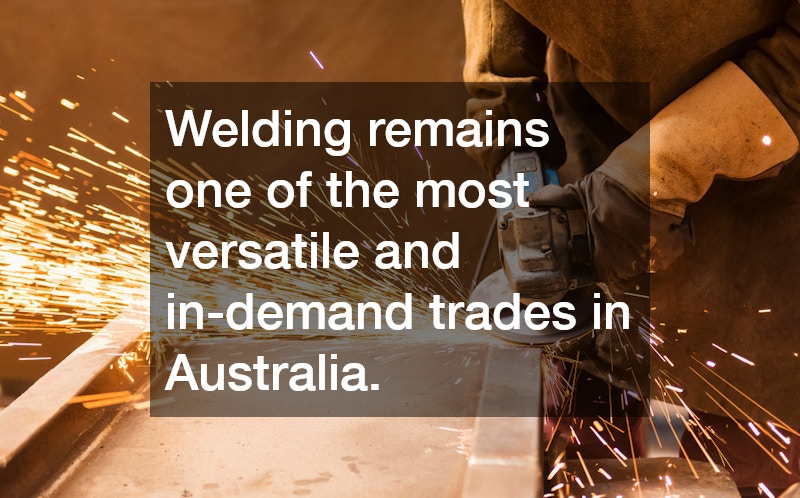Welding is a foundational trade that supports the growth of essential industries across Australia. From large-scale infrastructure projects to high-precision fabrication, skilled professionals in this field contribute significantly to the nation’s economy and public safety. The demand for experienced tradespeople continues to rise as sectors modernise, expand and compete globally.
The role of a welder is not limited to simply joining metals. It often requires strong technical knowledge, familiarity with evolving technologies and an ability to interpret plans and drawings with high accuracy.
This makes welding indispensable across a broad range of industries. Below are the top sectors that depend heavily on the work of qualified welding professionals.
Construction & Infrastructure
The construction sector is one of the largest employers in the welding trade. From residential buildings to commercial towers and bridges, steel structures form the backbone of modern construction. Welding is essential in assembling steel frames, installing supports and reinforcing critical load-bearing components.
Infrastructure projects such as tunnels, rail lines and highway overpasses rely heavily on precise and durable welded joints. The complexity of these undertakings means welding is not just about strength but also about compliance with safety codes, engineering specifications and industry standards.
In civil works, welding professionals are often needed on-site to make urgent adjustments or repairs during the build. The ability to assess and respond to structural challenges in real-time ensures projects can proceed without costly delays or risks to worker safety.
Manufacturing & Fabrication
Manufacturing in Australia spans multiple industries, including defence, automotive, machinery and consumer goods. Welding is at the heart of this sector, particularly in the fabrication of parts, vehicles, tools and heavy equipment.
In automotive manufacturing, robotic welding systems now dominate the assembly line, yet human oversight remains vital. Skilled tradespeople program, monitor and maintain these systems to ensure the highest level of accuracy and product integrity.
Defence manufacturing, especially shipbuilding and armoured vehicle production, requires advanced welding techniques. Workers in this area must meet strict compliance measures and demonstrate consistent precision under rigorous inspection standards.
Likewise, general fabrication shops that supply steel components to various sectors also rely on welding expertise. Each product or structure must be built to specification, whether it’s a custom staircase or a complex piece of machinery. This work demands a high level of accuracy, especially when small defects can lead to failure under stress.
Mining & Resources
The mining industry operates in some of the most demanding environments. Equipment is frequently exposed to abrasive materials, high loads and extreme wear. Tradespeople play a key role in fabricating, maintaining and repairing this machinery to prevent operational downtime and workplace hazards.
Pipeline construction for transporting gas, water or minerals also demands specialised welding skills. These pipelines must remain leak-free across vast distances and diverse terrains. As such, pipeline specialists require high certification levels and must complete their work under strict quality controls.
Energy & Utilities
With the rise of renewable energy, welding professionals are increasingly involved in the construction of wind farms, solar arrays and hydroelectric stations. The steel towers supporting wind turbines or the frames of solar panels must be fabricated and assembled with precision. These structures often face harsh environmental conditions, so welding quality directly affects long-term performance and reliability.
Gas and electricity utilities also rely on welding for network maintenance. Whether it’s underground cabling supports or pressure vessels, safe operation depends on secure and durable connections. Skilled tradespeople are essential to completing this work to regulated standards.
Transport & Logistics
Australia’s transport systems, from freight rail to public trams, involve significant welding work behind the scenes. Tracks, locomotives, wagons and support structures all require regular maintenance, often including welding-based repair or modification.
Shipbuilding is another major employer of welding professionals. With large commercial vessels and naval ships being constructed locally, there’s consistent demand for those trained in marine-specific welding methods. Workers in this space must meet both national and international codes for structural integrity and corrosion resistance.
In aviation, even though most components are bolted or riveted, welding is still essential in manufacturing ground equipment, tool support structures and certain aircraft parts. The high safety standards in aviation mean all work must be executed with the utmost precision.
Agriculture & Equipment Maintenance
Rural industries also depend on welding for farm machinery, fencing and structural repairs. Equipment like harvesters, seeders and ploughs undergo regular wear. Farmers and equipment technicians often rely on tradespeople to keep machinery in working condition throughout the year.
In agricultural processing facilities, stainless steel fabrication is common. Welding is needed to create hygienic and corrosion-resistant food-grade equipment. These tasks require clean welds free of contamination, often performed under strict quality assurance protocols.
Welding remains one of the most versatile and in-demand trades in Australia. A welder contributes far beyond the construction of physical structures — they help maintain national infrastructure, support industry innovation and play a central role in economic productivity. As industries evolve and expand, their reliance on skilled tradespeople only deepens.
Whether fabricating the frame of a skyscraper, restoring a railway bridge or repairing vital machinery, the skill and precision of a welder help shape the physical and economic landscape of the nation.




